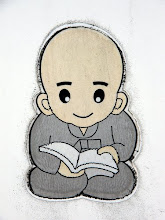俗姓卢,祖籍范阳(今河北省涿县)。慧能于公元672年到湖北黄梅参拜弘忍大师学法。慧能初见弘忍,弘忍便问他﹕「你是那里人? 来这里求取什么 ?」慧能回答﹕「弟子世岭南人,来到这里不求其它,只求「作佛」。」弘忍听了仍随口说﹕「你世岭南人,哪里能「作佛」! 」慧能回答﹕「人有南北之分,「佛性」并无南北之分。」这才使弘忍微微吃惊。慧能的回答使弘忍不便回绝,就安排他随众劳动,在碓房舂米。慧能乐于从命,终日舂米,干得欢快。当时弘忍的徒众有700人。在慧能入寺八个月之后,弘忍命各人呈上一首偈语,这实际上是一场考试,他要选择继承人。但慧能没资格参加,因为他只是干杂事的。神秀是众僧中的的上座和尚,他在半夜三更时分,独自掌灯,在佛堂的南廊写下一偈﹕「身是菩提树,心如明镜台,时时勤拂拭,莫使有尘埃。」清晨时,弘忍见到此偈后漠然不语,慧能闻声来到廊下,他要求也做一偈,得到许可,于是他高声念道﹕「菩提本无树,明镜亦非台,本来无一物,何使惹尘埃。」弘忍看到是慧能,就叫他退下,第二天弘忍把慧能给叫去,为慧能讲经又把世代相传的法衣交给他正式传他为禅宗六祖,并为他的安全着想,亲自送他到江州的渡口,吩咐他非要到必要的时机,不要把自己是禅宗六祖的身分讲出来,免得有禅宗的僧人来争夺。慧能来到岭南,渡过了15年的隐居生活。在唐高宗年间(676年),在广州遇到印宗法师,印宗法师为他剃发,授戒。至此,慧能才算是正式的僧人,在此之前只是「行者」。
不久慧能又从广州到了曹溪宝林寺﹕在这里,慧能正式「开山」传法。这时候,他在禅宗的地位得到确立,被称为「六祖大师」。而神秀则在北方传法。从此,南北分流,形成禅宗的南北两派。武后、中宗召请,终不赴京。禅宗自初祖以来,无顿渐之分,自六祖慧能开启顿门,嗣后并成为禅宗的正统。得法弟子四十人,其后支派并起,成为唐以后中国佛教的主流。或作惠能。门人法海编录其法语为《六祖坛经》。公元713年慧能在新州圆寂,弟子将其遗体应回曹溪,法相一直保持至今。
禅宗 -- 特重禅观,不重教理,自称教外别传。以菩提达摩为初祖,下传慧可、僧璨、道信、弘忍,弘忍之后分成南宗慧能,北宗神秀二派。北宗强调渐修,南宗主顿悟。弘忍圆寂后,北宗神秀大阐宗风于长安、洛阳。中唐以后,南宗成为禅宗的正统,并形成曹洞、云门、法眼、沩仰、临济五家。但宋朝以后则仅存曹洞、临济二脉。或称为佛心宗。
不久慧能又从广州到了曹溪宝林寺﹕在这里,慧能正式「开山」传法。这时候,他在禅宗的地位得到确立,被称为「六祖大师」。而神秀则在北方传法。从此,南北分流,形成禅宗的南北两派。武后、中宗召请,终不赴京。禅宗自初祖以来,无顿渐之分,自六祖慧能开启顿门,嗣后并成为禅宗的正统。得法弟子四十人,其后支派并起,成为唐以后中国佛教的主流。或作惠能。门人法海编录其法语为《六祖坛经》。公元713年慧能在新州圆寂,弟子将其遗体应回曹溪,法相一直保持至今。
禅宗 -- 特重禅观,不重教理,自称教外别传。以菩提达摩为初祖,下传慧可、僧璨、道信、弘忍,弘忍之后分成南宗慧能,北宗神秀二派。北宗强调渐修,南宗主顿悟。弘忍圆寂后,北宗神秀大阐宗风于长安、洛阳。中唐以后,南宗成为禅宗的正统,并形成曹洞、云门、法眼、沩仰、临济五家。但宋朝以后则仅存曹洞、临济二脉。或称为佛心宗。
One day, Hong Ren (Hung-jen), the fifth patriarch, called his disciples together and instructed them: "Each of you write a verse and bring it to me. I will read your verses, and if there is one who is awakened to the cardinal meaning, I will give him the robe and the Dhama and make him the Sixth Patriarch. Hurry, Hurry!"
The disciples returned to their cells, overwhelmed by the master's request. They agreed to let the first among them, Shen Xiu (Shen-hsiu), take on the task of composing a verse. Though well-instructed in the sutras, Shen Xiu was still far from enlightenment and the master's instructions threw him into a deep anxiety. At length he produced his verses and at midnight wrote on the middle wall of the south hall:
The body is the Bondhi tree, The mind is like a clear mirror. At all times we must strive to polish it. And must not let the dust collect.
Master Hong Ren was the first to see the verses the next morning. Assembling of the monks, he burned incense before the inscription on the wall. The disciples were filled with wonder and consider the question of succession settled. The master, however, called Shen Xiu aside. Having confirmed his suspicion that Shen Xiu had written the verses, the master said to him: "The verse you wrote shows that you still have not reached true understanding. You have merely arrived at the front of the gate but have yet to be able to enter it." As the verses make evident, practice can help ordinary persons, but it cannot bring them to perfect enlightenment. "You must enter the gate and see your own original nature..."
He left Shen Xiu to compose further verses. Days passes, but the first monk of the community could not produce a sign of his enlightenment.
Hui Neng, a young monk, heard about the verse and immediately realized that it did not express enlightenment. He formulated a new verse and have it posted on the wall of the west hall:
Originally there is no tree of enlightnment, Nor is there a stand with a clear mirror. From the beginning not one thing exists; Where, then, is a grain of dust to cling?
At midnight, Hong Ren summoned Hui Neng and conferred on him the Dharma of Sudden Enlightenment and the patriarchal robe with the words: "I make you the Sixth Patriarch."
From "Zen Buddhism: A History vol.1" by Heinrich Dumoulin, 1994
The disciples returned to their cells, overwhelmed by the master's request. They agreed to let the first among them, Shen Xiu (Shen-hsiu), take on the task of composing a verse. Though well-instructed in the sutras, Shen Xiu was still far from enlightenment and the master's instructions threw him into a deep anxiety. At length he produced his verses and at midnight wrote on the middle wall of the south hall:
The body is the Bondhi tree, The mind is like a clear mirror. At all times we must strive to polish it. And must not let the dust collect.
Master Hong Ren was the first to see the verses the next morning. Assembling of the monks, he burned incense before the inscription on the wall. The disciples were filled with wonder and consider the question of succession settled. The master, however, called Shen Xiu aside. Having confirmed his suspicion that Shen Xiu had written the verses, the master said to him: "The verse you wrote shows that you still have not reached true understanding. You have merely arrived at the front of the gate but have yet to be able to enter it." As the verses make evident, practice can help ordinary persons, but it cannot bring them to perfect enlightenment. "You must enter the gate and see your own original nature..."
He left Shen Xiu to compose further verses. Days passes, but the first monk of the community could not produce a sign of his enlightenment.
Hui Neng, a young monk, heard about the verse and immediately realized that it did not express enlightenment. He formulated a new verse and have it posted on the wall of the west hall:
Originally there is no tree of enlightnment, Nor is there a stand with a clear mirror. From the beginning not one thing exists; Where, then, is a grain of dust to cling?
At midnight, Hong Ren summoned Hui Neng and conferred on him the Dharma of Sudden Enlightenment and the patriarchal robe with the words: "I make you the Sixth Patriarch."
From "Zen Buddhism: A History vol.1" by Heinrich Dumoulin, 1994
